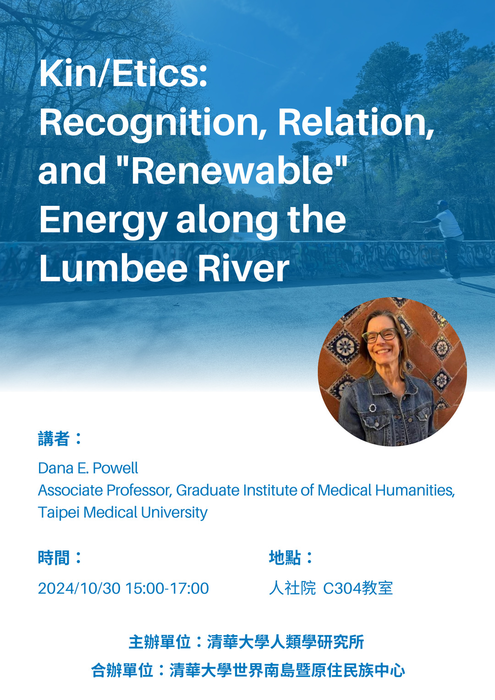Kin/Etics: Recognition, Relation, and "Renewable" Energy along the Lumbee River

Presenter:Dana E. Powell
Associate Professor, Graduate Institute of Medical Humanities. Taipei Medical University
Time:10/30(Wed. )15:00-17:00
Location : College of Humanities and Social Sciences C304
What relations among rivers, humans, other beings, and technologies, structure Indigenous recognition? And how might Indigenous recognition be related to health and wellbeing? This talk explores these broad questions by tracking environmental practices and epistemologies among members of the Lumbee Tribe of North Carolina who care for their ancestral Lumbee River in a landscape shaped by industrialized agriculture fused with energy extraction. In the face of a settler-state led "green turn" toward projects like biogas and biomass development, a longstanding Lumbee movement for increased recognition and territorial justice confronts new adversaries in the name of "just transitions." Drawing on collaborative ethnography and methods of knowledge co-production, this talk explores how energy development in North Carolina's rural Coastal Plains has threatened Lumbee self-determination while, at the same time, activated new relations and innovations advancing Lumbee recognition.
Associate Professor, Graduate Institute of Medical Humanities. Taipei Medical University
Time:10/30(Wed. )15:00-17:00
Location : College of Humanities and Social Sciences C304
What relations among rivers, humans, other beings, and technologies, structure Indigenous recognition? And how might Indigenous recognition be related to health and wellbeing? This talk explores these broad questions by tracking environmental practices and epistemologies among members of the Lumbee Tribe of North Carolina who care for their ancestral Lumbee River in a landscape shaped by industrialized agriculture fused with energy extraction. In the face of a settler-state led "green turn" toward projects like biogas and biomass development, a longstanding Lumbee movement for increased recognition and territorial justice confronts new adversaries in the name of "just transitions." Drawing on collaborative ethnography and methods of knowledge co-production, this talk explores how energy development in North Carolina's rural Coastal Plains has threatened Lumbee self-determination while, at the same time, activated new relations and innovations advancing Lumbee recognition.
